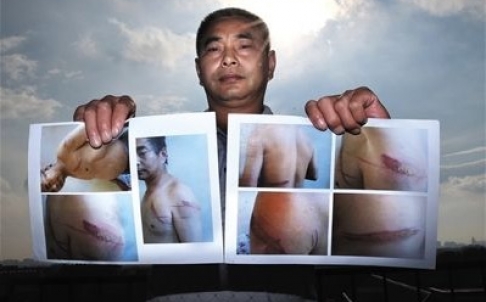While central authorities have claimed that criminal justice reforms since 2008 have helped to curb the practice of extracting pre-trial confessions with torture, recent reports from human rights organizations have found that the practice continues, and is being used against rights lawyers and activists amid an ongoing crackdown on civil society. Last month, Chinese officials insisted on the central government’s commitment to ending torture in front of a U.N. Committee Against Torture panel, but irked rights advocates and former detainees present by dodging specific questions. Following the hearing, the U.N. panel report determines that torture remains entrenched in China’s criminal justice system, and reiterates concern for lawyers and legal advocates in detention since the “Black Friday” crackdown in July. The New York Times’ Nick Cumming-Bruce reports:
The panel of 10 independent experts welcomed changes undertaken by China since its last appearance in 2008, including amendments to its criminal procedure law that prohibited the use of confessions obtained through torture and required audio or video recordings of interrogations in major cases. It also noted China’s abolition of re-education through labor and changes to a law covering the treatment of refugees.
[…] The panel expressed regret that China had not put in place recommendations dating from 2009 for providing legal safeguards against torture, concluding that it “is still deeply entrenched in the criminal justice system, which overly relies on confessions as the basis for convictions.”
Moreover, the panel expressed concern over amendments to the criminal procedure law that now permit holding people under “residential surveillance” for up to six months for undefined crimes of endangering state security. […] [Source]
Reuters’ Stephanie Nebehay relays more specific concerns from the report and from panel members:
The U.N. watchdog said it had numerous credible reports that “document in detail cases of torture, deaths in custody, arbitrary detention and disappearances of Tibetans”.
“We can also say that some of the problem pointed out in 2008 are still problems,” panel member Jens Modvig told a news briefing. “China has not provided data about complaints over torture, about investigations, about possible convictions for torture and data on death in custody and the like.”
[…] “When you are accused of a crime of national security you do not have the right to fundamental safeguards, namely access to a lawyer. This is for an indefinite time, you will have access to a lawyer when the prosecution determines the reason for the detention have disappeared,” chairman Claudio Grossman told Reuters.
[…] Voicing concern at deaths in custody and the alleged lack of prompt medical care, it cited the cases of the activist Cao Shunli and Tenzin Delek Rinpoche, a prominent Tibetan monk. She died in jail last year and he in July 2015.
The U.N. experts decried China’s use of an interrogation chair with restraints. [Source]
Beijing has dismissed the U.N. panel’s call, and expressed their own concerns with the review process, suggesting that the U.N. committee “review its work style.” Also at Reuters, Ben Blanchard and Sui-Lee Wee report:
China is “resolute and determined on its opposition to the use of torture” and has made much progress in this regard, Foreign Ministry spokeswoman Hua Chunying said.
“We have noticed that the opinions of the U.N. commission against torture are based on unverified information,” Hua told a daily news briefing.
“We hope they can scrupulously abide by their mandate, further improve their work style and view China’s honoring of its agreements more fully and more objectively.”
[…] Hua said other countries “should respect the right of Chinese legal authorities to process their cases in accordance with the law”. [Source]
Meanwhile, China’s call for the halting of a U.N. Security Council meeting on human rights in North Korea failed to raise the needed votes in Geneva.







